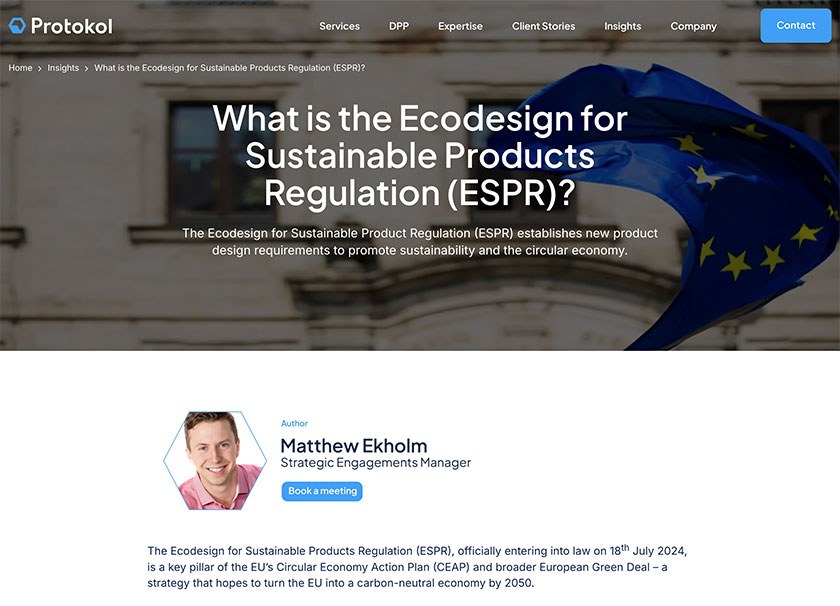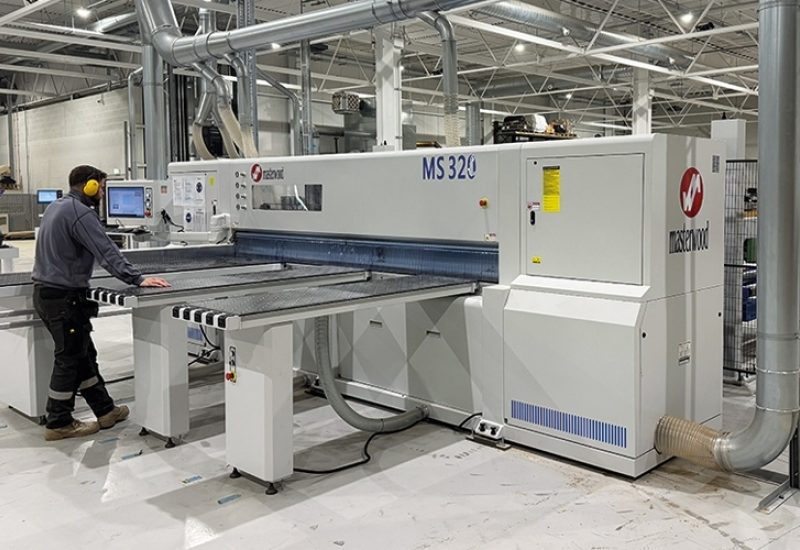Preparing for the EU’s ESPR
The EU’s new Ecodesign for Sustainable Products Regulation (ESPR) is set to transform how Ireland’s furniture industry designs, tracks, and sells its products. In this article, Matthew Ekholm of Protokol outlines three key compliance milestones every Irish furniture business should know.

By Matthew Ekholm, Digital Product Passport and Circularity Specialist at Protokol
What the Irish furniture industry needs to know: three compliance focus points under the EU’s ESPR
In the summer of 2024, the EU’s Ecodesign for Sustainable Products Regulation (ESPR) came into force and was initially viewed as a distant sustainability policy, but quickly became a pressing priority for the furniture industry. With a focus on making sustainable products the standard across the EU, many furniture manufacturers, suppliers, and retailers set to be impacted have spent months trying to unpack the complexities of the legislation and grasp its long-term implications.
The ESPR will apply to any business placing furniture on the EU market, meaning Irish manufacturers, designers, and suppliers must prepare now. Central to the regulation is the introduction of Digital Product Passports (DPPs), which will capture details such as material composition, sourcing, repairability, and recyclability. These are core issues for a sector under increasing scrutiny to extend product lifecycles, reduce waste, and embrace circular design.

For Ireland’s furniture sector, a vital part of the country’s wood, joinery, and interiors supply chain, the challenge is significant. Many companies operate across a uniquely complex network of SMEs, specialist manufacturers, and design-led firms. At the same time, Ireland’s environmental commitments and the visibility of its export market place the industry under added pressure to lead on compliance and sustainability.
To help businesses stay ahead of the curve, we’ve mapped out three key compliance milestones that Irish furniture companies should have on their radar in the coming year.
Introduction of the regulation: The Energy Labelling Working Plan 2025-2030 (released April 2025)
After the ESPR came into force in July 2024, there has been a long wait for the next official news on the task for businesses across priority sectors.
After a lengthy and complex period, in April this year, the Working Plan was published, outlining its improvement expectations for the furniture sector, including improving resource use and the impact of production.
The Working Plan says that every product for which ecodesign measures will have to be adopted will have a DPP (a digital record of information about the product), to open up data access for businesses and public authorities.
Being aware at this stage that DPPs will be a mandatory requirement means that businesses can begin to consider their plan of action for their deployment. This can include mapping where data that may be needed is located, to exploring the offering of DPP solution providers.

Protokol offers a clarity on a range of issues available online, or by booking a meeting with Matthew
Furniture-specific Timelines: the Delegated Acts (Likely by 2028)
Over the coming years, the EU is expected to publish its delegated acts - setting out the exact requirements for the data to be captured within DPPs. The exact timeline for the delegated acts being announced varies by industry and product group. For the furniture industry the delegated act is expected to be published by 2028, and will likely outline the formal data requirements around material sourcing, repairability, recyclability, and even second-life or resale information.
Well-prepared Irish businesses by this point will have mapped the location of relevant data across their operations and supply chains. Following the delegated acts coming into force, the Irish furniture industry will be in a good position to learn from their pilots and be more confident in their DPP implementation plan to achieve compliance.
By taking these steps, furniture manufacturers will avoid scrambling once the delegated acts land, and instead turn compliance into a competitive edge.
Compliance-ready: 18 months after Delegated Acts are released
Once the delegated acts are published, businesses will typically have up to 18 months to comply. The EU reserves the right to shorten this timeframe if there’s a strong environmental urgency or alignment with other policy goals. Therefore, Irish furniture companies should plan for the tightest possible deadline.
This will be the moment to put all preparatory work into practice: testing, refining, and scaling DPP systems across product lines. By then, sectors like iron and steel (delegated act due 2026) and textiles (2027) will already be further along in their compliance journey. Furniture firms can learn from their experiences, adopting strategies that worked and avoiding pitfalls.
Although 2028 may feel distant, the compliance clock is already ticking. For Irish furniture manufacturers, fit-out specialists, and suppliers, each milestone is an opportunity not just to prepare for regulation but to showcase leadership in sustainability, circularity, and innovation.









